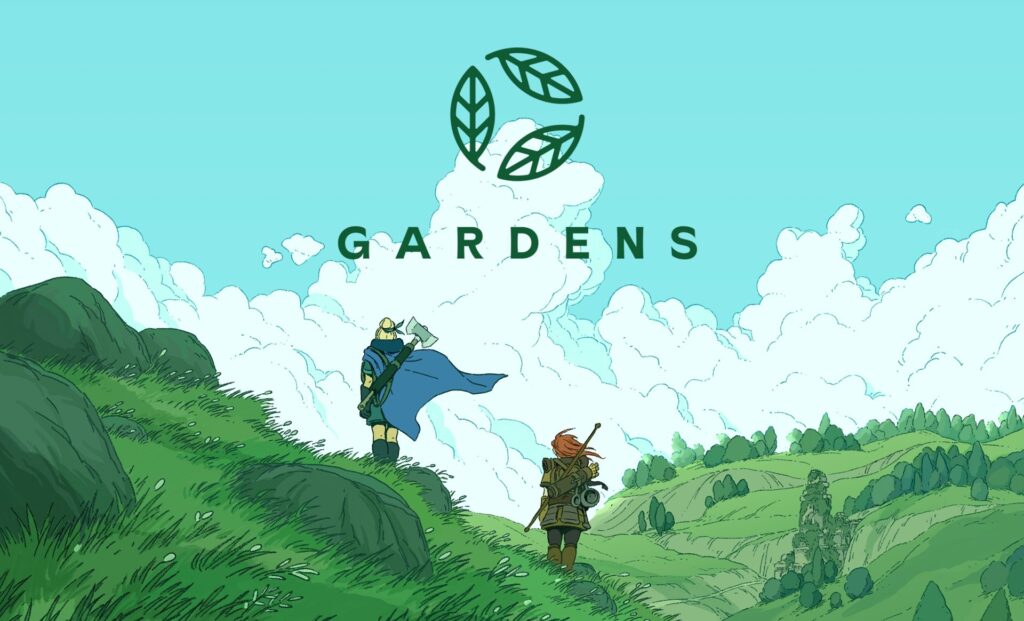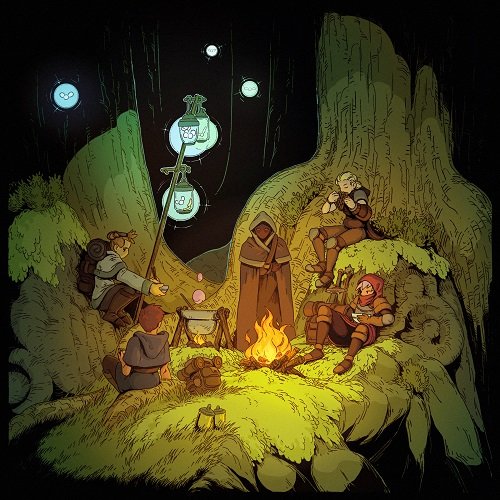
This week, a handful of industry creatives pulled back the curtain on a new indie development studio called Gardens. While it is based primarily in Portland and Los Angeles, Gardens boasts a remote-first working structure with a focus on transparency and inclusivity. The studio was founded by Chris Bell, his brother Stephen Bell, and Lexie Dostal, who have collectively worked on a number of indie darlings like What Remains of Edith Finch, Journey, Sky: Children of the Light, Blaseball, and Dustforce.
“We formed Gardens with the goal of growing a studio that cares as much about the lives and wellbeing of its developers as it does the games we create together,” Chris Bell told GameDaily. “Stephen is my brother, and Lexie and I have been close friends for a long time. Over those years, we’d regularly talk about the games we want to make and play, particularly online games, and the kind of studio and culture we’d want to grow together.”
That culture, according to Bell, puts people first. The goal is to make everybody feel welcome, to provide a comfortable work environment where developers can work at a comfortable pace without fear of reprisal. This mission statement has already attracted a number of developers who have worked on AAA titles like Spider-Man and Skyrim.
“We’ve all experienced the negative effects of crunch culture and other forms of abuse that are so rampant in the industry,” Bell explained. “Crunch negatively affects a person’s health, personal life, and relationships. It also produces worse work. And so when we came together to create Gardens, we knew we wanted to try our hardest to do things differently.”
Building such an environment is a tall order to be sure, and it requires accountability from everybody at the studio. This sort of communal growth is not unlike tending a garden–hence the company name.
“Gardens” also refers to the kind of games Bell and company want to make: “lush, living online spaces that bring players together to cultivate lasting friendships and share surprising and novel multiplayer experiences. Worlds that thrive thanks to the care put in by their communities.”
Consider the games the Gardens team has worked on in the past. Titles like Sky and Journey rely on social interaction for the full experience, but the social elements are untraditional when it comes to a multiplayer environment. Limited dialogue options (or none at all) necessitate creative communication between players, which can lead to memorable interactions.
This is a tenet that carries into Gardens’ first title, though the team isn’t ready to divulge any specific details just yet.
“Our upcoming flagship game is a shared fantasy adventure inspired by some of our favorite memories playing online games, particularly moments shared with strangers,” Bell said. “Players will find themselves crossing paths in a shapeshifting, unpredictable wilderness filled with mystery and magic, featuring a timeless visual direction and innovative, tactile multiplayer play.”

Bell wants players to express themselves through gameplay, which allows communication across traditional language barriers. Doing so requires a careful approach to the communication tools provided by the developers. Interacting with strangers should feel like a significant experience, Bell said, a goal derived from some of the team’s favorite gaming memories.
“We’re inspired by stories from playing online games over the years, and many of our most memorable were shared with strangers,” he explained. “Games like Journey, World of Warcraft, Dark Souls, Valheim, and great survival games.”
Bell passed along a story from co-founder Lexie Dostal, who was saved from death by a stranger in World of Warcraft. Afterwards, the two adventured together for several hours. Bell also recounted an experience he had himself while playing Final Fantasy XI Online.
“I was venturing through a desolate area of the world when I came upon a stranger sitting quietly. I sat next to them, and after some time, asked them what they were doing there. They had traveled there simply to watch the rain. Which was the same reason that I was there.”
These are the types of moments Bell wishes to recreate with Gardens. He also wants to build a world that grows and evolves based on the actions of the players within it. The result, ideally, is a sense of shared ownership and responsibility over both the world and the people who live there. Said concisely, the game world should reflect those who play within it.
This is the same for Gardens as a development studio. Diversity and inclusion are a priority for the company, and Bell hopes to cultivate a varied team. Gardens’ approach to this thus far has been to hire the core leadership team first, people who know how to build great games and inspire new voices.
“We believe that our games and studio culture grow more creative and mindful the more that we bring together people with different lived experiences and perspectives,” he explained. “We work to identify and hire people from traditionally underserved and overlooked communities, and we put a heavy emphasis on training and mentorship, taking care to make room for our teammates’ goals and ambitions, to give people the opportunity to learn new skills and grow into leadership positions.”
In a nod to equitability, Gardens employs a “pay band” system where any two employees with the same years of experience earn comparable salaries. Bell said that this is a way to address historically underpaid departments like QA and art. Again, this reflects the values of transparency and collective growth at Gardens.
Building a studio requires a great deal of capital. Last year Gardens received $4.5 million in seed funding, which was led by Transcend Fund, with contributions from 1Up Ventures, FunPlus, and a private investment from Rothschild & Co. global partner David Baron. The investment will help the studio grow its core team and help get the ball rolling on its ambitions for equitable pay.
“Because of this funding, we’re able to attract exceptional talent and provide real, robust benefits and material support to our developers well into the future,” Bell said. “It’s why we can offer competitive pay, equitable salaries across departments, 401k contributions, stock options, mentorship, and other incentives that ensure anyone who joins is well compensated, cared for, and shares in the success and growth of our games and studio.”
The hope is that Gardens’ first game will form the financial spine of the company, an ongoing, living game that can support future projects. All this is an effort to build a healthy, creative work environment characterized by transparency and equitability.
There’s still a ways to go before Gardens is ready to show off what it’s working on, but, for now, it’s impossible to deny the pedigree of the founding team and its penchant for unique experiences. In 2012, Journey reexamined what it meant to be a multiplayer game, while Sky took nonverbal communication to its next step in 2019. Meanwhile, Blaseball has developed a thriving community of its own centered on a passive game experience, and What Remains of Edith Finch took a new approach to storytelling.
Considering the background of Gardens’ founding members, it’s hard not to be excited for whatever the team is working on.
Sam, the Editor-in-Chief of GameDaily.biz, is a former freelance game reporter. He's been seen at IGN, PCGamesN, PCGamer, Unwinnable, and many more. When not writing about games, he is most likely taking care of his two dogs or pretending to know a lot about artisan coffee. Get in touch with Sam by emailing him at sdesatoff@rektglobal.com or follow him on Twitter.
 GameDaily.biz © 2026 | All Rights Reserved.
GameDaily.biz © 2026 | All Rights Reserved.